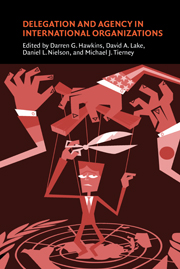Book contents
- Frontmatter
- Contents
- List of figures
- List of tables
- Notes on contributors
- Preface
- Part I Introduction
- Part II Variation in principal preferences, structure, decision rules, and private benefits
- Part III Variation in agent preferences, legitimacy, tasks, and permeability
- 7 How agents matter
- 8 Screening power: international organizations as informative agents
- 9 Dutiful agents, rogue actors, or both? Staffing, voting rules, and slack in the WHO and WTO
- 10 Delegating IMF conditionality: understanding variations in control and conformity
- 11 Delegation to international courts and the limits of re-contracting political power
- Part IV Directions for future research
- References
- Index
- Titles in this series
8 - Screening power: international organizations as informative agents
from Part III - Variation in agent preferences, legitimacy, tasks, and permeability
Published online by Cambridge University Press: 22 September 2009
- Frontmatter
- Contents
- List of figures
- List of tables
- Notes on contributors
- Preface
- Part I Introduction
- Part II Variation in principal preferences, structure, decision rules, and private benefits
- Part III Variation in agent preferences, legitimacy, tasks, and permeability
- 7 How agents matter
- 8 Screening power: international organizations as informative agents
- 9 Dutiful agents, rogue actors, or both? Staffing, voting rules, and slack in the WHO and WTO
- 10 Delegating IMF conditionality: understanding variations in control and conformity
- 11 Delegation to international courts and the limits of re-contracting political power
- Part IV Directions for future research
- References
- Index
- Titles in this series
Summary
INTRODUCTION
The 2003 military intervention against Iraq inspired numerous commentators to lament the failure of the United Nations (UN) Security Council during the episode. Supporters of the Bush Administration policy argued that the Council's unwillingness to explicitly endorse military action amounted to a failure to confront threats to international order and exposed the organization as weak, or even “irrelevant” and “impotent.” Less predictably, some members of the international law community offered a critique on legalistic grounds. The Security Council, they argued, did not stop the United States from intervening unilaterally, thereby failing to fulfill its role as defender of international law and promoter of international peace. In a talk before the American Society of International Law, for example, Richard Falk (2004: 2) judged the Security Council “deficient” with respect to the “war prevention goals of the Charter.” In a more sweeping critique, international law scholar Michael Glennon (2003: 16) laments the “rupture of the UN Security Council,” which failed “to subject the use of force to the rule of law.”
These criticisms can be challenged on their own terms: After all, the Security Council did not endorse the war, and its mandated inspections appear – especially in retrospect – to have been very useful in containing and defanging Iraq. But they also rely on a narrow and largely inaccurate view of the Security Council's role in coercive military intervention.
- Type
- Chapter
- Information
- Delegation and Agency in International Organizations , pp. 229 - 254Publisher: Cambridge University PressPrint publication year: 2006
- 16
- Cited by



